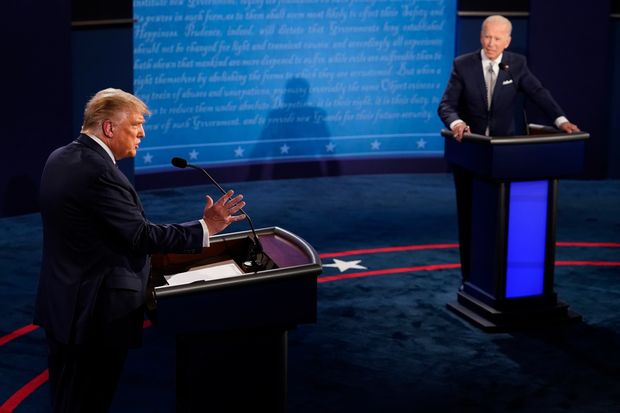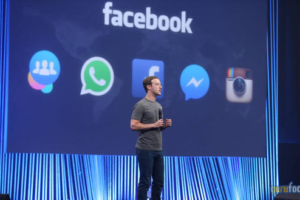
President Donald Trump debates Democratic challenger Joe Biden last month. Most analysts said it was the longest public exchange on climate change they could remember Trump engaging in.
Getty Images
Climate-change questions surprisingly crept in during the last 10 minutes of the first raucous presidential election debate this month, the first time in eight years that the important topic for younger voters especially was given such attention in this setting.
Vice President Mike Pence on his own raised the issue of fracking for oil and natural gas when he squared off against Democratic rival Sen. Kamala Harris in their debate last week, while in his televised town hall this week Joe Biden talked up electric vehicles and carbon capture — a technology that Republican lawmakers have also supported. Now, President Donald Trump, once counted in the “denial” camp, will be challenged formally again on climate change.
The issue is officially on the agenda when the final debate between Trump and Biden takes place on Thursday, Oct. 22, at Belmont University in Nashville, Tenn. The face-off begins at 9 p.m. Eastern Time and will run for 90 minutes without commercial interruption.
The moderator, MSNBC’s Kristen Welker, has selected her topics: fighting COVID-19; American families, race in America, climate change, national security and leadership, according to the Commission on Presidential Debates. The topics could be amended depending on the news cycle, the commission added. The debate will be shown live on all U.S. major networks and cable news channels. Viewers can also stream the debate live on YouTube and other services like C-SPAN.
Read: Fracking and the ‘Green New Deal’: Here’s where Trump and Biden stand on climate change
The debate commission has vowed steps to ensure “additional structure” in the format after Trump, and then Biden, frequently talked over each other during their first debate.
Questions in the first presidential debate touched on many of the same issues announced for the final meeting, including race relations and the coronavirus pandemic, but it was difficult at times to discern the candidates’ positions.
The second in-person debate, expected as a joint town hall with voters on Oct. 15, was reformatted initially as a virtual event due to Trump’s COVID-19 diagnosis. Trump backed out though and he and Biden held competing solo town halls on different networks instead.
Many voters want the candidates to link topics such as the COVID-19 recovery to broader issues like climate change, with environmental groups anxious to see that fiscal stimulus measures and the economic recovery are designed to include green job growth and investment in infrastructure for renewable energy. In recent weeks, bipartisan groups have sent up a warning signal for climate change’s risk to the financial system. And China’s own zero-emissions pledge pressures the U.S. to formalize its climate stance as the two economic giants work on trade, security and more.
Sen. Harris found herself at her debate with VP Pence defending Biden’s stance on the controversial practice of fracking, which has boosted the U.S. role in global energy markets. Biden hasn’t always been clear on his position for expanding fracking, which can be destructive to ecosystems and pose other risks, but is linked to jobs in key election states and has held down energy costs. Accordingly, fracking is likely to come up again before the Nov. 3 election.
Read: Pence misleads on Biden-Harris fracking stance, and debate viewers ask, ‘What is fracking, again?’
Biden has also been challenged to distinguish aspects of his own plan from the Green New Deal advanced by the more-progressive arm of the Democratic party. The candidate has tried to be more specific in recent weeks. During his Oct. 15 town hall, he said electric vehicle growth will save “billions of gallons of oil” and help create 1 million auto industry jobs.
“We’re not investing,” Biden said. “We’re not doing any of the research.” It wasn’t clear if he meant shortfalls within the auto industry or the federal government, leaving analysts to suggest the outlook for EVs is likely to come up again this week.
General Motors Co. GM, +2.63% and Ford Motor Co. F, +0.65% have committed to spending tens of billions of dollars on electric and autonomous vehicles in the next few years. And luxury EV maker Tesla TSLA, -2.05% remains one of the most popular stocks to track by far.
Read: IEA crowns renewables ‘new king’ of world electricity markets as oil demand will flatten by 2030
At the first presidential debate Moderator Chris Wallace pushed Trump about pulling the U.S. out of the voluntary international Paris climate accord and his administration’s rollback of environmental protections.
“I want crystal clean water and air, we now have the lowest carbon … if you look at our numbers now we are doing phenomenally,” Trump replied. He called the Paris agreement a “disaster,” which in the past he has blamed on noncompliance from big polluters in the developing world.
Trump repeated that historic wildfires on the U.S. West Coast in recent years, which scientists have pinned in part on climate extremes, are due to poor forest management, but just more than half of California forests are federally managed land.
“For the first time, President Trump acknowledged that human activity has, at least in part, caused climate change,” the American Conservation Coalition, a conservative environment group, said in a statement after the first debate.
The left-leaning policy bloc Climate Power 2020 is encouraged by the topic’s inclusion in the final debate, but wants assurances it will be treated with the seriousness that other topics are given.
“Too often, climate questions hinge on whether a candidate believes in the science, allowing climate deniers to cast false doubt on the fact the climate crisis is here and already harming families across the country. Or questions are framed as an outdated choice between economic growth or clean energy…,” said the group’s executive director Lori Lodes.
“As climate fires rage across the West, the Gulf Coast suffers from a record-shattering hurricane season and droughts and extreme heat put the health of communities at risk, people need to know what the candidates will do about it,” she said.
Read: Amy Coney Barrett says ‘politically controversial’ climate change is still a matter of public debate



